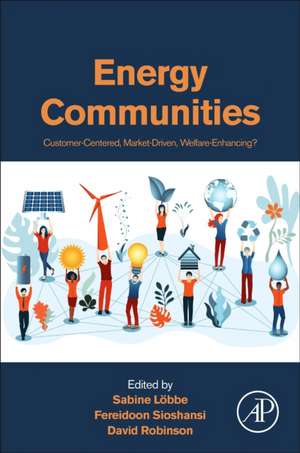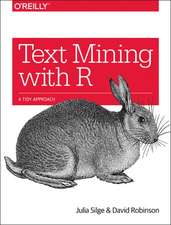Energy Communities: Customer-Centered, Market-Driven, Welfare-Enhancing?
Editat de Sabine Loebbe, Fereidoon Sioshansi, David Robinsonen Limba Engleză Paperback – 4 iul 2022
- Defines and conceptualizes the energy community for the current generation of researchers and practitioners facing the energy transition
- Explores the main benefits and challenges in forming energy communities and to what extent they are welfare-enhancing
- Examines under what terms, conditions, regulations or policies energy communities can be beneficially and successfully organized and why
- Reviews the combination of business models and forms of organization which are conducive to economic feasibility and the commercial success of energy communities
Preț: 742.81 lei
Preț vechi: 970.54 lei
-23% Nou
Puncte Express: 1114
Preț estimativ în valută:
142.15€ • 147.57$ • 118.53£
142.15€ • 147.57$ • 118.53£
Carte tipărită la comandă
Livrare economică 15-29 martie
Preluare comenzi: 021 569.72.76
Specificații
ISBN-13: 9780323911351
ISBN-10: 0323911358
Pagini: 514
Dimensiuni: 152 x 229 mm
Greutate: 0.68 kg
Editura: ELSEVIER SCIENCE
ISBN-10: 0323911358
Pagini: 514
Dimensiuni: 152 x 229 mm
Greutate: 0.68 kg
Editura: ELSEVIER SCIENCE
Public țintă
Early career researchers, policymakers and regulators investigating topics around energy communities, energy economics, consumer and prosumer behavior, and the energy transition.Cuprins
Part 1: The Concept of Energy Communities and Their Regulatory Framework
1. A taxonomy of energy communities in liberalized energy systems
2. The EU policy framework for energy communities
3. Energy communities: A US regulatory perspective
4. Developing a legal framework for energy communities beyond energy law
5. Alignment of energy community incentives with electricity system benefits in Spain
6. The “virtual model for collective self-consumption in Italy
7. Energy Communities: A North American Perspective
8. Energy Communities: Challenges for Regulators and Policymakers
Part 2: The Appeal of Energy Communities to Customers and Citizens
9. What motivates private households to participate in energy communities? A literature review and German case study
10. Community energy initiatives as a space for emerging new imaginaries?
11. The construction of a citizen-centered ecosystem for renewable energies in France
12. Energy communities’ social role in a just energy transition
Part 3: Enabling Technologies, Community Design, and Business Models
13. The path to energy communities via local energy management and digital customer care
14. Governing energy communities: The role of actors and expertise in business model innovation
15. Grid-friendly clean energy communities and induced intra-community cash flows through peer-to-peer trading
16. Italian Energy Communities from a DSO’s Perspective
17. Community energy design models in Brazil: From niches to mainstream
18. Institutional and policy context of energy communities in France and Italy: How to increase the welfare-enhancing capacity of the sector
19. The digitalization of peer-to-peer electricity trading in energy communities
Part 4: Case Studies and Implementation
20. Enabling Business Models and Grid Stability: Case Studies from Germany
21. Energy communities in Europe: A review of the Danish and German experiences
22. Platform-based energy communities in Germany and their benefits and challenges
23. A community-based biomethane heat network:Case study from Trier
24. Establishing Energy Communities in Post-Communist States:The Case of Bulgaria
25. Sustainable island energy systems: A case study of Tilos island, Greece
1. A taxonomy of energy communities in liberalized energy systems
2. The EU policy framework for energy communities
3. Energy communities: A US regulatory perspective
4. Developing a legal framework for energy communities beyond energy law
5. Alignment of energy community incentives with electricity system benefits in Spain
6. The “virtual model for collective self-consumption in Italy
7. Energy Communities: A North American Perspective
8. Energy Communities: Challenges for Regulators and Policymakers
Part 2: The Appeal of Energy Communities to Customers and Citizens
9. What motivates private households to participate in energy communities? A literature review and German case study
10. Community energy initiatives as a space for emerging new imaginaries?
11. The construction of a citizen-centered ecosystem for renewable energies in France
12. Energy communities’ social role in a just energy transition
Part 3: Enabling Technologies, Community Design, and Business Models
13. The path to energy communities via local energy management and digital customer care
14. Governing energy communities: The role of actors and expertise in business model innovation
15. Grid-friendly clean energy communities and induced intra-community cash flows through peer-to-peer trading
16. Italian Energy Communities from a DSO’s Perspective
17. Community energy design models in Brazil: From niches to mainstream
18. Institutional and policy context of energy communities in France and Italy: How to increase the welfare-enhancing capacity of the sector
19. The digitalization of peer-to-peer electricity trading in energy communities
Part 4: Case Studies and Implementation
20. Enabling Business Models and Grid Stability: Case Studies from Germany
21. Energy communities in Europe: A review of the Danish and German experiences
22. Platform-based energy communities in Germany and their benefits and challenges
23. A community-based biomethane heat network:Case study from Trier
24. Establishing Energy Communities in Post-Communist States:The Case of Bulgaria
25. Sustainable island energy systems: A case study of Tilos island, Greece



























